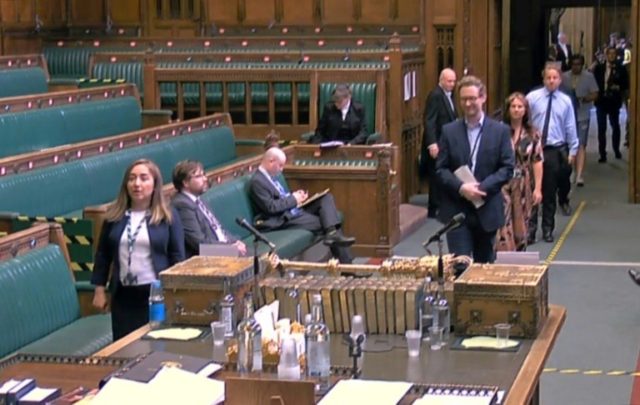London (AFP) – Britain’s House of Commons on Tuesday abandoned its experiment with remote voting, despite warnings the move will disenfranchise vulnerable lawmakers still staying at home because of coronavirus.
The decision was made in a lengthy physical vote, where hundreds of MPs slowly filed through the lower elected parliamentary chamber to cast their ballots while keeping apart to avoid the spread of COVID-19.
At the height of Britain’s outbreak in April, the Commons broke 700 years of convention by allowing MPs to contribute to debates via videolink and to vote remotely.
But Prime Minister Boris Johnson’s government says that as the nationwide stay-at-home order is eased, normal parliamentary service must now resume.
Many MPs objected, including a number from Johnson’s own Conservatives, but an amendment seeking to retain remote voting was defeated by 242 votes to 185.
More than 39,000 people with coronavirus have died in Britain — the worst toll in Europe and second-highest in the world — and the number is still rising by more than 100 a day.
Valerie Vaz, from the main opposition Labour party, accused ministers of “living in another universe” by forcing MPs to attend Westminster.
The government’s own Equality and Human Rights Commission warned it would “place at significant disadvantage” MPs unable to be there whether because of their age, disability, a health condition or pregnancy.
Disabled Conservative MP Robert Halfon told the BBC that people like him were being “denied their fundamental parliamentary duty, which is to vote… in essence making us all parliamentary eunuchs”.
MPs from Northern Ireland and Scotland also complained that continued restrictions on travel made it hard for them to be in London.
One Scot said it took him 18 hours to get to Westminster for Tuesday’s vote.
But Jacob Rees-Mogg, the government’s minister in the Commons, said parliament could only function effectively while being physically present.
He also suggested that remote voting undermined the gravity of the choices involved, saying: “Voting while enjoying a sunny walk or whilst watching television does democracy an injustice.”
He said the existing pairing system remained available, where MPs from opposite sides agree both not to vote, to cancel out the effect of their absences.
However, most MPs dislike using this system because it does not allow them to register their view.
Rees-Mogg also said he would put forward plans to enable MPs to take part remotely in certain proceedings, such as debates.

COMMENTS
Please let us know if you're having issues with commenting.